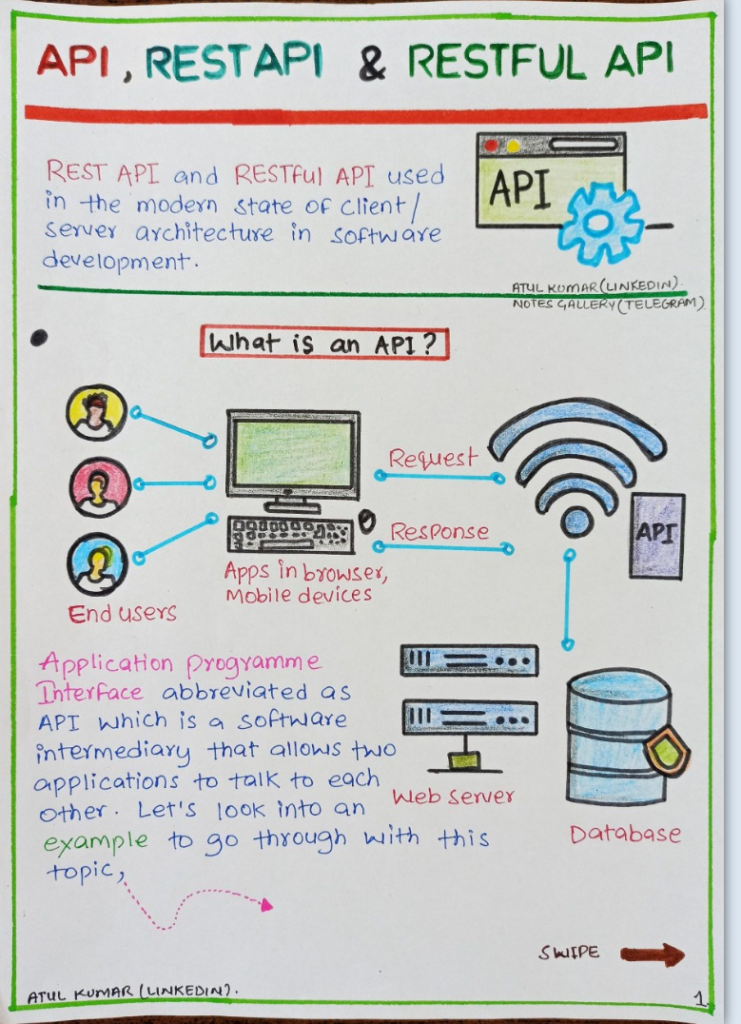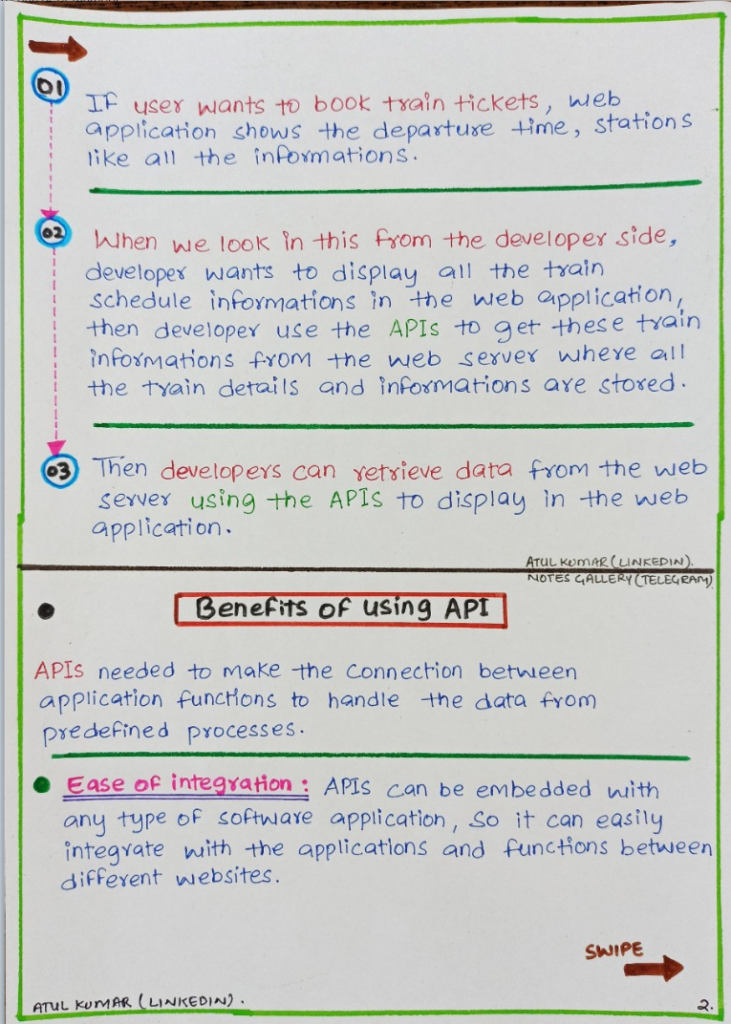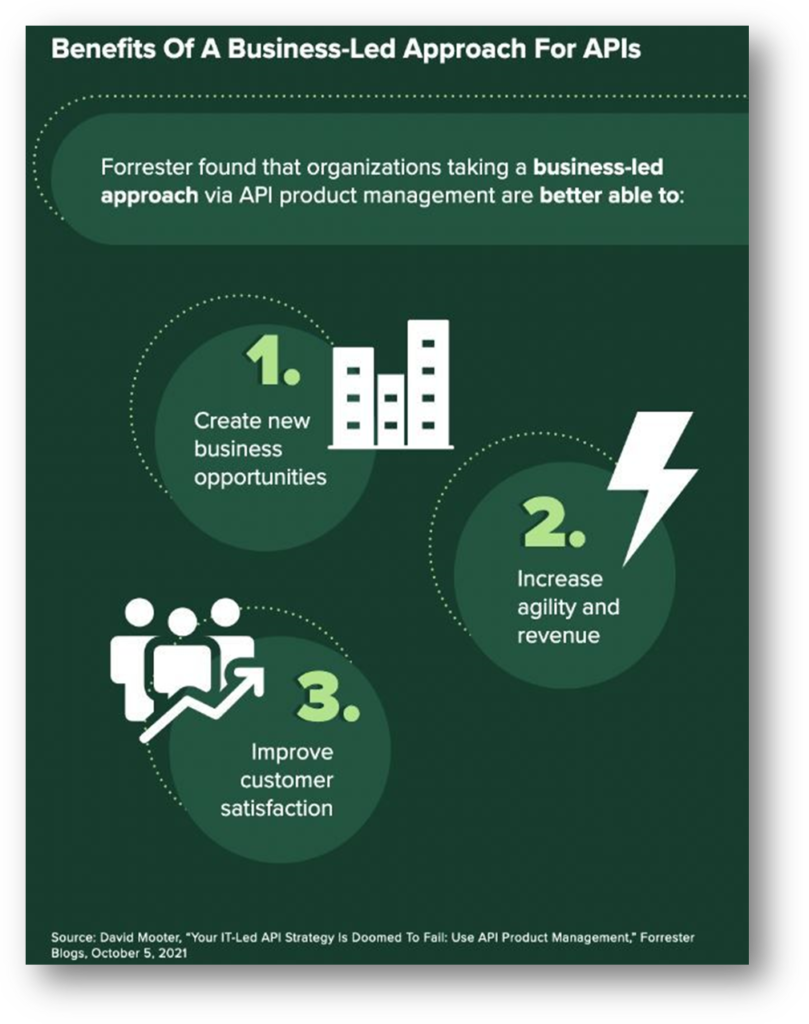

Source: Atul Kumal from Linkedin
APIs can bring value to a company by helping with innovation and development, but only a few can make money directly. A good API strategy can help simplify things and save money in the long run. To build a successful API strategy, consider these steps:
- Decide on the strategy based on the business, target audience, and API usage.
- Organize APIs based on data sensitivity, importance, and usage.
- Make sure the APIs you choose are valuable.
- Set up different portals, security measures, and paths for internal and external users.
- Measure the success of your APIs using metrics.
- Have a service level agreement policy that considers your backend capacity.
Having a clear API strategy can help simplify things and save money in the long term. It also has these benefits:
- Helps you understand things faster
- Gives you confidence in your investments
- Makes things more flexible
- Prevents things from getting too complicated
- Let’s communicate changes easily across the company.
Source is API Expert David Roldan

An Introduction to Monetizing APIs in the Banking Industry
The African banking industry has been rapidly evolving in recent years, with a growing emphasis on digital transformation and innovative financial technology solutions.
One area that is gaining traction in the region is the monetization of APIs (Application Programming Interfaces) in the banking sector.
APIs are the building blocks that enable financial institutions to expose their systems and data to third-party developers, who can then create new financial products and services based on this data.
By monetizing their APIs, banks can generate new revenue streams, enhance their brand, and improve customer engagement.
An example of this in Africa is the Kenya Commercial Bank (KCB), which has been a leader in the use of open APIs in the region. The bank has made its APIs available to developers, allowing them to create innovative financial products and services based on KCB’s data and systems.
This has helped the bank to increase its revenue and improve its customer engagement, as well as enhancing its reputation as a forward-thinking financial institution.
Another African bank that has embraced the monetization of APIs is Standard Bank Group, based in South Africa. The bank has created a platform called Open API that enables developers to build new financial products and services using Standard Bank’s systems and data.
This has helped the bank to generate new revenue streams and improve its customer engagement, while also establishing it as a leader in the field of API monetization.
In conclusion, the monetization of APIs in the African banking industry is a growing trend that has the potential to bring significant benefits to financial institutions in the region.
By making their systems and data available to developers, banks create new revenue streams, enhance their brand, and improve customer engagement, while also contributing to the development of the African financial technology ecosystem.
The Benefits of Open Banking for Banks and Financial Institutions

Open banking is a financial system where banks and other financial institutions make customer data accessible to authorized third-party providers. This allows customers to manage their financial information and payments through a variety of apps and services (multi-channel).
In the African banking industry, open banking gained significant traction in recent years. It is poised to revolutionize the way banks and financial institutions operate.
In this section, let’s explore the key benefits of open banking for banks and financial institutions in Africa.
- Improved Customer Experience: Open banking enables banks to offer customers a more seamless and convenient banking experience. For example, customers can access their financial information and make payments from a single app, without having to log into multiple bank accounts. This results in a better user experience and increased customer satisfaction.
- Increased Efficiency: Open banking allows banks to automate many manual processes, such as account opening and loan application. This results in increased efficiency and reduces operational costs.
- Enhanced Security: Open banking mandates strict security measures, such as two-factor authentication and encryption, to protect customer data. This enhances security and reduces the risk of fraud.
- New Revenue Streams: Open banking enables banks to partner with fintech companies and offer new and innovative financial services. This creates new revenue streams and helps banks stay competitive in a rapidly evolving market.
- Improved Data Analytics: Open banking allows banks to access a wealth of customer data, which can be used to gain insights into customer behavior and preferences. This information can be used to improve product offerings and target customers more effectively.
Examples from the African banking industry show the potential benefits of open banking. For example, Standard Bank in South Africa has partnered with fintech company TymeBank to offer customers a new way to bank.
The partnership has enabled Standard Bank to reach a new customer base and offer innovative financial services. Another example is Absa Bank in Kenya, which has implemented open banking to streamline its operations and offer customers a more convenient banking experience.
References:
TymeBank ropes in TFG to expand its footprint
Strategies for Monetizing APIs in the Financial Services Industry

Application Programming Interfaces (APIs) have become a crucial aspect of the financial services industry. They enable banks and other financial institutions to offer customers seamless and innovative services.
In the African banking industry, APIs have the potential to unlock significant revenue streams, but realizing this potential requires careful planning and execution.
In this section, we’ll explore some of the strategies for monetizing APIs in the African financial services industry.
- Charge for Access: One of the simplest ways to monetize APIs is to charge for access. Banks can charge third-party developers and fintech companies for access to their APIs. This enables them to offer new and innovative financial services to customers.
- Offer Premium Features: Banks can offer premium features through their APIs, such as enhanced security and increased transaction limits. These premium features can be offered at an additional cost. This provides a new revenue stream for banks.
- Leverage Data: APIs provide banks with access to valuable customer data, which can be used to gain insights into customer behavior and preferences. This data can be monetized by selling it to third-party companies or using it to develop targeted marketing campaigns.
- Partner with Fintechs: Banks can partner with fintech companies to offer new and innovative financial services through their APIs. This creates new revenue streams and helps banks stay competitive in a rapidly evolving market.
Statistics show the growing importance of APIs in the African financial services industry.
For example, a recent study found that the number of fintech companies in Africa has increased by 50% in the past five years, driven in part by the increasing use of APIs.
Another study found that the value of the African fintech market is expected to reach $2.2 billion by 2023, driven by the growth of APIs.
Examples from the African banking industry demonstrate the potential of monetizing APIs.
For example, Standard Bank in South Africa has developed a comprehensive API platform that enables third-party developers to build financial services on top of its platform.
This has allowed the bank to generate new revenue streams and offer innovative services to customers.
Another example is Absa Bank in Kenya, which has implemented a robust API platform that enables it to partner with fintech companies and offer new financial services.
The Future of Banking with Open Banking and APIs

The African banking industry has undergone significant changes in recent years, driven by technological advancements, increased competition, and changing customer needs.
The introduction of open banking and APIs has further transformed the industry, providing new opportunities for growth and innovation.
APIs, or application programming interfaces, are a key component of open banking, providing secure and efficient connections between different systems and platforms.
In Africa, the adoption of open banking and APIs has been slow compared to other regions, but it is gradually gaining momentum.
A recent survey of African banks found that only 17% currently offer open banking services, but nearly 60% plan to do so within the next two years. This indicates a strong demand for these services and a recognition of their importance for the future of the banking industry.
Some of the benefits include:
- Increased competition and innovation. By allowing third-party providers to access financial data, banks can better understand their customers’ needs. They also align preferences and offer more personalized and relevant products and services. This, in turn, leads to increased customer satisfaction and loyalty.
- Increased efficiency and cost savings. By using APIs, banks can automate many processes, such as account opening and customer onboarding. This reduces the time and resources required to perform these tasks. This leads to lower costs and improved profitability for banks, as well as faster and more convenient services for customers.
Real-World Examples of Banks Monetizing APIs and Open Banking
The implementation of open banking and APIs has provided a new avenue for banks to monetize their services.
Real-world examples of banks monetizing APIs and open banking in Africa exist, showcasing the potential of this new technology.
- Charge third-party providers for access to their data and services. For example, a bank may offer API access to its payment’s infrastructure. This allows third-party providers to build new financial products and services that integrate with the bank’s platform. In exchange, the bank may charge a fee for each API call made by the third-party provider.
- Offer premium services to customers. For example, a bank may offer customers access to their financial data through an API. Hence customers easily manage their finances and make better-informed decisions. The bank can charge a fee for these premium services, providing a new revenue stream.
Regulators have an important role to play in supporting the monetization of APIs and open banking in the African banking industry.
Regulators are responsible for establishing standards for data protection and security, ensuring that customer data is handled in a safe and secure manner.
Regulators can also encourage innovation by supporting the development of new financial products and services that make use of open banking and APIs.
Regulators also have a critical role to play in ensuring the success of this new technology, by establishing clear standards and practices.
Preparing for the Future of Banking with a Strong API Strategy
To remain competitive in an increasingly crowded marketplace, banks in Africa must prepare for the future of banking by developing a strong API strategy.
This includes investing in technology, training employees, and establishing partnerships with third-party providers to drive innovation and growth.
By embracing APIs and open banking, banks can position themselves for success in the years to come.

Source: Pixabay
Understanding the Role of APIs in Digital Transformation of Banking:
APIs have emerged as a critical component of digital transformation in the banking industry:
- Helping banks connect and integrate different systems and platforms.
- Improve customer experiences.
- Increase efficiency and drive innovation.
In the African banking industry, the adoption of APIs has gained momentum in recent years, with major banks such as Standard Bank, First National Bank, and Absa Group, among others, leading the way.
For example, Standard Bank has used APIs to launch its “Open Up” platform, which enables businesses to access its financial services programmatically.
Best Practices for Securing APIs in the Banking Industry:
With the increasing use of APIs in the banking industry, it is imperative to ensure their security to protect sensitive customer information and maintain public trust.
Best practices for securing APIs in the banking industry include implementing robust:
- Authentication and authorization processes
- Using encryption to secure sensitive data
- Regularly monitoring and testing API security
For example, Absa Group has put in place robust API security measures, including multi-factor authentication and data encryption, to ensure the security of its API-powered services.
Navigating the Legal and Regulatory Landscape of Open Banking and APIs in Banking:
The legal and regulatory landscape of open banking and APIs in the banking industry can be complex and challenging to navigate, with different countries having different laws and regulations.
Banks in Africa must be aware of these laws and regulations, including data protection regulations such as the General Data Protection Regulation (GDPR), And the Protection of Personal Information Act (POPI) in South Africa, to ensure compliance and offer secure and reliable API services to their customers.
The Intersection of Artificial Intelligence and Open Banking in Banking:
The integration of artificial intelligence (AI) and open banking has the potential to revolutionize the banking industry by providing customers with personalized financial advice, improving the efficiency of banking processes, and reducing costs.
For example, Standard Bank has integrated AI into its open banking platform, enabling customers to access personalized financial advice and recommendations based on their unique financial situation.
The Impact of Open Banking on Consumer Banking Services had ensured more financial inclusion and autonomy.
For example, First National Bank has leveraged open banking and APIs to launch its “FNB Connect” platform, which allows customers to manage their finances, make payments, and access financial services from a single platform.
Banks in Africa that embrace these technologies will be well positioned to take advantage of new opportunities for growth and innovation.
For example, Ecobank, one of the largest pan-African banks, has used APIs to launch its “Ecobank Fintech” platform, which provides access to a range of financial services and
SOURCES:


0 Comments